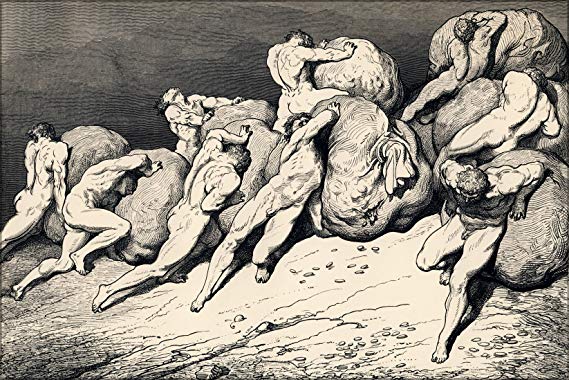
Monday
Rereading Dante’s Inferno in preparation for my course on Representative Masterpieces, my attention was caught by Dante’s description of the hoarders and the wasters, who are to be found in the fourth circle of Hell. That’s because I have been reading about Donald Trump’s “historically unprecedented action[s] to roll back a slew of environmental regulations that protect air, water, land and public health from climate change and fossil fuel pollution.” CSNBC reports that, according to Harvard Law School’s rollback tracker, the administration is targeting 85 or so environmental rules:
Existing environment regulations are meant to curb greenhouse gas emissions, protect land and animals from oil and gas drilling and development, as well as limit pollution and toxic waste runoff into the country’s water. The administration views many of them as onerous to fossil fuel companies and other major industries.
Dante doesn’t distinguish between the wasters and the hoarders, seeing them all in the grip of the same materialist mania. The heavy weights they roll against each other symbolize the dead weight of gold, with which they are obsessed:
Here too, I saw a nation of lost souls, far more than were above: they strained their chests against enormous weights, and with mad howls rolled them at one another. Then in haste they rolled them back, one party shouting out: “Why do you hoard?” and the other: “Why do you waste?” So back around that ring they puff and blow, each faction to its course, until they reach opposite sides, and screams as they go the madmen turn and start their weights again to crash against the maniacs.
Not only are our own hoarders and maniacs indistinguishable, but often they are the same people. I think of those who champion huge tax cuts for the wealthy (wasting) but moan about the cost of food stamps and medicare expansion (hoarding). Or the way the billionaire recipients of those tax cuts refuse to invest the money in more jobs or higher wages, instead rewarding their stockholders with stock buybacks that make them even wealthier. Whining incessantly about regulations, they perfectly fit Virgil’s description of them:
Not all the gold that is or ever was under the sky could buy for one of these exhausted souls the fraction of a pause.
Although Dante encounters many recognizable figures in Hell, those who give their lives over to money are so empty as to be unrecognizable. History, which honors many who served humankind, will not remember these exhausted souls. Virgil explains,
In their sordid lives they labored to be blind, and now their souls have dimmed past recognition.
And further on:
Hoarding and squandering wasted all their light and brought them screaming to this brawl of wraiths. You need no words of mine to grasp their plight. Now may you see the fleeing vanity of the goods of Fortune for which men tear down all that they are, to build a mockery.
As Dante describes them, the damned are eager to get to the circle of Hell that awaits them. Since they desired this empty existence on earth, why should they want anything different after death?
"My son," the courteous Master said to me,
"all who die in the shadow of God's wrath
converge to this from every clime and country.
"And all pass over eagerly, for here
Divine Justice transforms and spurs them so
their dread turns wish: they yearn for what they fear."
Sacrificing all that is honorable and sacred for wealth is hell on earth, yet people eagerly take this path. Also self-condemned are those who believe that happiness can only be achieved through incessant purchases. Dante’s genius lies in finding memorable metaphors, poetically expressed, for how we violate our higher selves.

